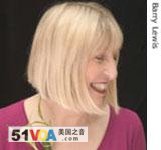I'm Nancy Beardsley, filling in for Avi Arditti and Rosanne Skirble. This week on Wordmaster we'll talk about bad manners-and how they're reflected in what people are saying and not saying to one another these days.
Our guest is British writer Lynne Truss, whose new book is called "Talk to the Hand: The Utter Bloody Rudeness of the World Today, or Six Good Reasons to Stay Home and Bolt the Door." She takes her title from the expression "Talk to the hand, 'cause the face ain't listening," which captures some of the frustration she describes in trying to interact with people in public.
Ms. Truss says there is a link between the subject of her latest book and her earlier best seller about punctuation, called "Eats, Shoots and Leaves."
 |
"And what we're beginning to realize is that other people don't accept that that's the rule. They have a different rule, which is never speak to anybody. And if anybody speaks to you, tell them in the roughest possible terms to go away.
NB: "And neglecting to say things like 'please,' 'thank you,' or 'I'm sorry,' is the first example of bad manners you write about in this book. What makes those lapses so irritating?"
LYNNE TRUSS: "It's just so interesting that people don't notice the gap. It seems very straightforward. They are only words, why don't people say them? Once you look into it, of course, you realize that politeness and being aware of other people is not just to make the other person feel better. It is to make one's self better. It is to give a sense the world is a safe place. If everybody obeys the same rules, then the world seems safe."
NB: "And then there's the second example of rudeness in your book--all those push button choices and recorded messages we find whenever we try to do business these days. Aren't they supposed to make our lives easier?"
LYNNE TRUSS: "Yes, and they dress it up a lot, these automated switchboards. They often say you have all the control here. And of course what's happening is that businesses are taking advantage of the technology they have now to make us do all the work of getting in touch with them. We can't just call them up and ask for anything. We have to navigate their system."
NB: "And that's followed by number three on your list of rude annoyances, which you call 'My Bubble, My Rules.' What's that mean?"
LYNNE TRUSS: "That is people treating the outside as though it's inside, being out in public as though they are in private. And obviously having private phone calls in public places is the biggest example of that. And they're very defiant. If you were to deliberately look at them as if to say, you are in public, they would look at you with complete shock that you should dare to impinge on their privacy."
NB: "Which is your next complaint about inconsiderate behavior today: we don't dare tell people they're being rude for fear of encountering even more rudeness?"
LYNNE TRUSS: "Yes. For a while I did try to say things to people, and I was so shocked by the kind of response I got, because to them, breaking into their bubble is itself very rude, and they feel justified in being very rude in return. People are not regarding themselves as a community. They just regard themselves all as individuals."
NB: "And you also suggest there's a widespread lack of respect for age or authority or stature, which you refer to as booing the judges. Would you talk more about that?"
LYNNE TRUSS: "That's a really shocking thing. In the U.K., we're very disrespectful towards celebrities, to the royal family and to judges and teachers. While we do want more egalitarianism, surely if you have that philosophy, then everyone should treat everyone with the same respect."
NB: "And finally, the rude behavior you describe as someone else will clean it up. What does that mean when it comes to good manners?"
LYNNE TRUSS: "I think a lot of people feel that anything they do is not only their right to do, they also are not responsible for it. If they've done something bad, then you can blame somebody else, or you can blame the system. It's never 'I did it. I made the decision. I chose it.'"
NB: "Do you see any root causes for all this rude behavior?"
LYNNE TRUSS: "I think some of the root causes are probably very well intentioned. Parenting was meant to be kind, to give kids less discipline and less shame and fear, and so you end up with people who have got a lot of self respect, but they haven't got much respect for other people.
"And we've also got a technology that encourages a rather lonely life of being on your own and in control. But we do have a responsibility to other people. We are part of the human race, and we do have to pull together sometimes."
NB: Lynne Truss is the author of "Talk to the Hand: The Utter Bloody Rudeness of the World Today, or Six Good Reasons to Stay Home and Bolt the Door." And that's Wordmaster for this week. Our e-mail address is word@voanews.com, and you can find all of our segments posted at voanews.com/wordmaster. Filling in for Avi Arditti and Rosanne Skirble, this is Nancy Beardsley.